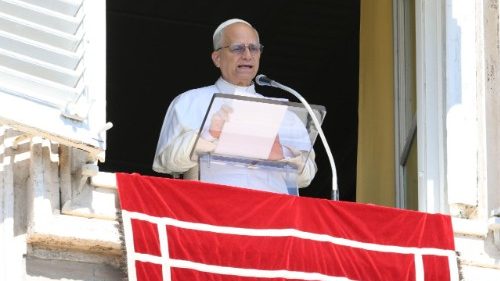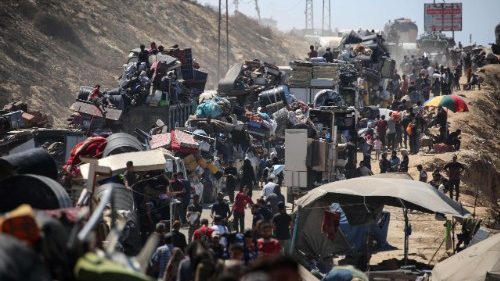

In a world already heavy with conflict, the voice of Pope Leo once again rose with moral clarity on Sunday. Addressing the faithful after the Angelus, the Holy Father turned the eyes of the global Church toward Gaza, urging peace and rejecting the cycle of violence.
“There is no future based on violence, forced exile, or vengeance,” Pope Leo declared. His words were not only a spiritual plea but also a direct appeal to leaders, communities, and those caught in the relentless struggle in the Holy Land.
The Pope’s remarks came immediately after greeting representatives of Catholic associations committed to solidarity with the people of Gaza. Expressing gratitude, he acknowledged their tireless work to provide aid and hope amid destruction.
“Dear friends,” he said, “I appreciate your initiative and the many others throughout the Church that express closeness to our brothers and sisters suffering in that tormented land.”
A Cry for Peace
“Peoples need peace,” the Pope affirmed. “Those who truly love them work for peace.”
With these words, Pope Leo placed the Christian message of reconciliation at the heart of one of the world’s most intractable conflicts. His plea echoed his previous calls to end hostilities and prioritize humanitarian care for those suffering.
The Holy Father also aligned himself with the Pastors of the Churches throughout the Holy Land, reminding the world that the pain of Gaza is a wound that cuts across nations and faiths.
Gaza Under Fire
The Pope’s appeal came as reports emerged of heavy Israeli bombardments on Gaza City. At least 60 Palestinians were killed on Saturday alone, according to Gaza health authorities. The assault forms part of a wider offensive launched last week.
Israeli forces have destroyed high-rise buildings, targeted underground tunnels, and dismantled booby-trapped structures as they advanced. Their operations have pushed into the eastern suburbs of Gaza City, and military officials are eyeing further gains toward the city’s central and western districts.
The scale of displacement has been staggering. Israeli officials estimate that nearly half a million people have fled Gaza City since the beginning of the month. Hamas disputes that figure, claiming the number is closer to 300,000, while more than 900,000 civilians remain trapped inside the enclave.
Amid this chaos, fewer than 50 Israeli hostages are still believed to be held by Hamas and allied groups.
A Human Cost Without Precedent
The toll of two years of war is almost unimaginable. Since Israel launched its invasion of Gaza following the deadly Hamas assault on southern Israel in October 2023, more than 65,000 Palestinians have been killed.
The war was sparked when Hamas fighters crossed into southern Israel, killing some 1,200 people—mostly civilians—and kidnapping around 250 others, both soldiers and civilians. Many of those hostages have since been released in deals brokered by mediators, though dozens remain in captivity.
The Israeli military campaign that followed has turned Gaza into what aid groups describe as “a landscape of ruins.” Whole neighborhoods have been flattened, health infrastructure is near collapse, and shortages of food, water, and medicine deepen the humanitarian disaster.
The Pope’s Warning
In this bleak context, Pope Leo’s words cut through with both urgency and compassion. His insistence that violence and vengeance cannot shape the future points to the futility of continued bloodshed.
The Pope’s appeal highlights the universal yearning for peace—a peace rooted not in conquest but in justice, compassion, and mutual recognition.
By thanking Catholic associations for their solidarity with the people of Gaza, the Holy Father underscored the Church’s role not only in prayer but also in tangible acts of aid. His message was clear: the suffering of Gaza must not be ignored, and the international community cannot afford silence.
A Call to Conscience
The war in Gaza is not merely a geopolitical crisis; it is a human tragedy. Every death, every forced exile, every broken family underscores the Pope’s reminder that peace is not optional—it is essential for survival.
“There is no future based on violence, forced exile, or vengeance,” he warned. The alternative, as he emphasized, is to work tirelessly for peace.
As bombs continue to fall and families remain displaced, the Pope’s voice stands as both a moral challenge and a beacon of hope. His call echoes across borders: to end the war, to heal the wounds, and to choose humanity over destruction.
